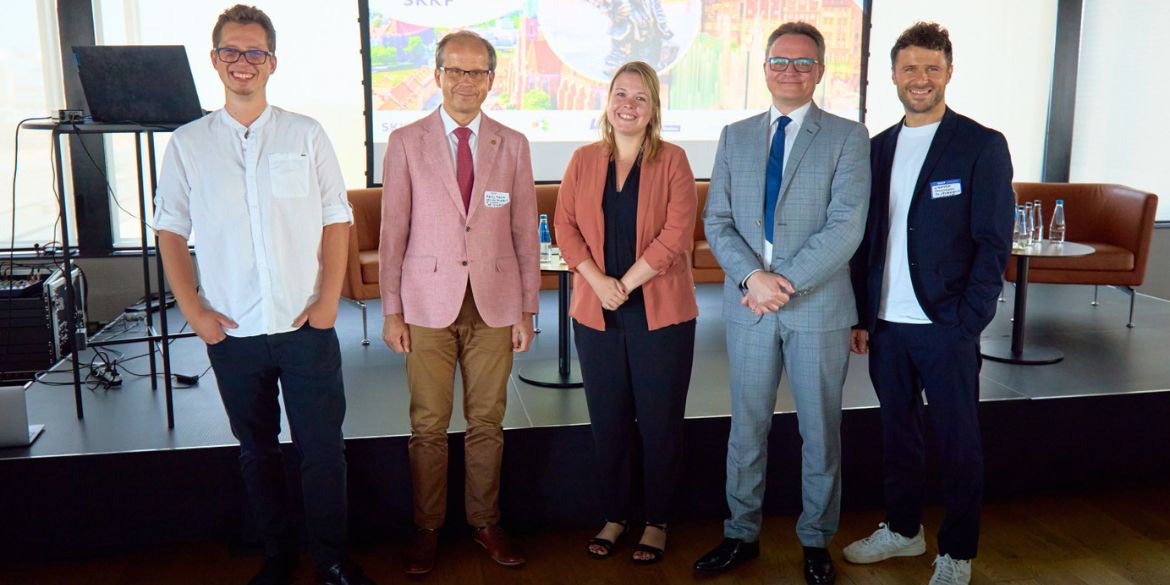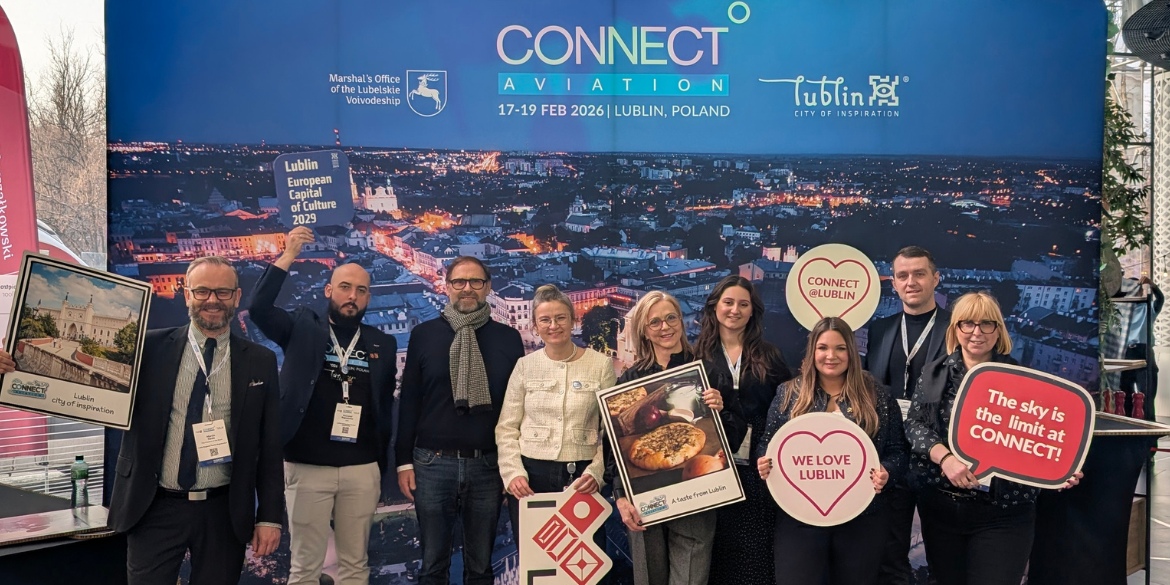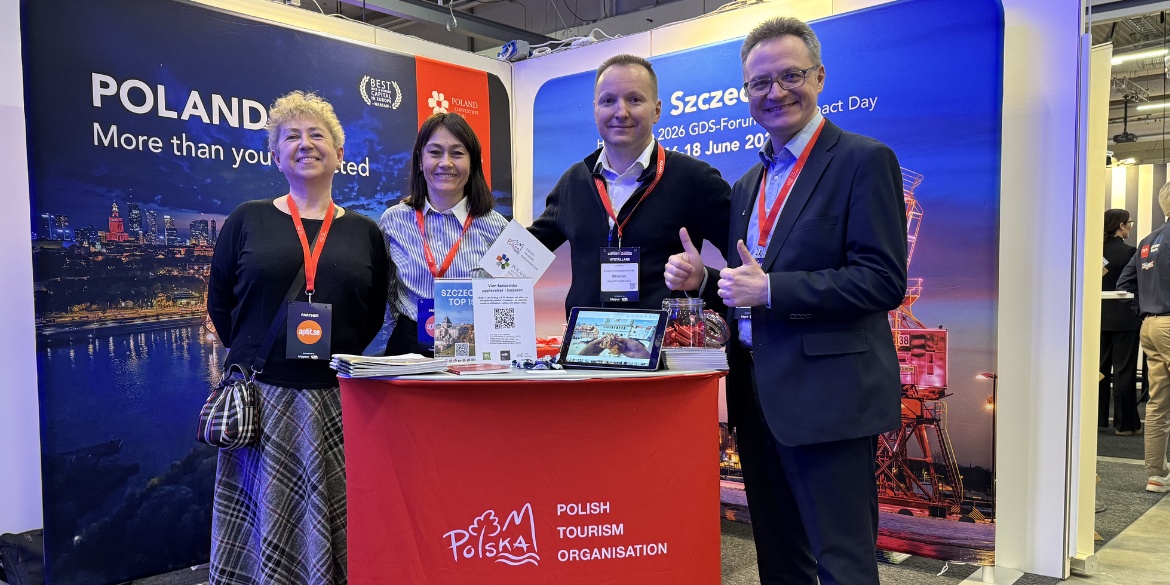Will artificial intelligence revolutionise tourism, or will it present a challenge for the industry? This was the key question posed during the discussion panel “Tourism in the Age of AI: A Technological Shift – Opportunity or Threat?”, held as part of the Spotlight on Poland conference in Wrocław. The debate was initiated by the Poland Convention Bureau – Polish Tourism Organisation. Participants had the opportunity to explore cutting-edge AI-based tools, global examples of marketing campaigns, and data analytics powered by artificial intelligence, showcased at IMEX Frankfurt 2024. The discussion highlighted that while AI brings numerous benefits to the meetings and tourism industry, its effective implementation requires awareness, responsibility, and… human creativity.
Opening
The discussion panel, whose focus was the topic “Tourism in the Age of AI: New Technological Reality as an Opportunity or Threat?”, was opened by Jarosław Marciuk from the Polish Tourism Organisation – Poland Convention Bureau, and Sina Bünte from Digital Mind Events, with a presentation titled “AI Introduction.”
At the start of the event, participants were asked a question via the Slido app: How often do you use AI tools at work? The responses were as follows:
- Occasionally – 47%
- Several times a week – 27%
- Daily – 20%
- Never, but I would like to start – 7%
Generative AI in Destination Marketing
In the interactive part, Jarosław Marciuk presented examples of promotional campaigns utilising generative artificial intelligence. Participants watched videos and photos generated by Midjourney for campaigns promoting countries and cities, such as ‘Why imagine when you can experience?’ from the Kingdom of Jordan, ‘UnArtificial Art’ from Vienna, ‘Lithuania, an experience to share’ from Lithuania, and ‘What if [Vincent van Gogh] visited Korea?’ from South Korea. The promotional campaign results from the Kingdom of Jordan showed a 75-fold increase in website visits, 95% positive sentiment on social media, and a tenfold return on investment from media publications connected to the campaign.
There were also examples from Poland. The campaign “W Podlaskiem jeżdżę z kaskiem” (“In Podlaskie, I Ride with a Helmet”), prepared by the White Bits agency for the Podlaskie brand, was a huge success last year, and June 2024 saw the launch of its second edition. Importantly, the campaign contributed to increased awareness and more frequent use of bike helmets by both children and adults.
How the Polish Tourism Organisation uses the potential of generative AI
The Polish Tourism Organisation also uses the potential of generative AI. A campaign prepared by the London office used images generated by Midjourney, juxtaposing them with real photos of Polish cities. The films promoting city breaks in Warsaw and Gdańsk on the British market were displayed on Meta platforms (Facebook, Instagram), Snapchat, and TikTok. The ads, shown for 14 days in May, generated almost 5 million impressions and reached 3.6 million people. The campaign’s budget was the same as in similar efforts, but its reach turned out to be over three times higher.
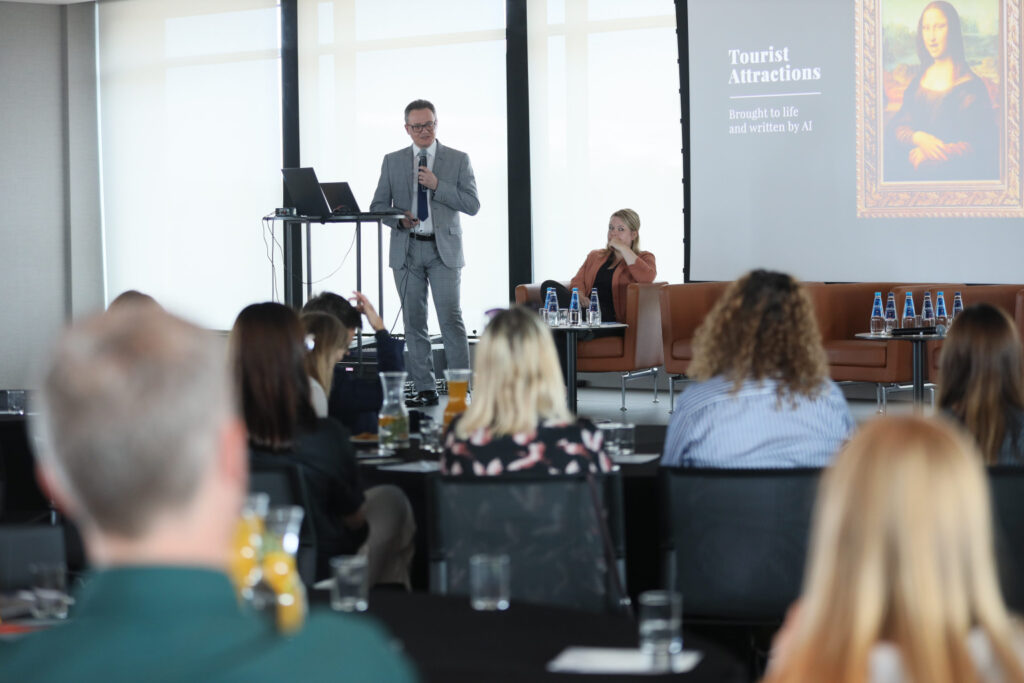
Zenus AI
The potential of artificial intelligence was also utilised at the IMEX Frankfurt 2024 business tourism fair. In the Gallery, which is located between halls 8 and 9, the Poland Convention Bureau organises its annual Musical Mornings, during which Poland’s musical ambassador, Basia Giewont, performs live concerts with a band. According to information provided by IMEX and using the AI tool Zenus, the event enjoyed significant interest and engagement from fair participants.
Zenus is an analytics solution designed for commerce and events. A discreet camera was installed near the Musical Mornings zone in the Messe Frankfurt Gallery to record the behaviour and facial expressions of people in the space over the three days of the fair. The study provided a metric expressing the percentage of eye contact showing predominantly positive sentiment, which Zenus calls “Energy.” The tool provides values for parameters such as “Stop Rate,” “Dwell Time,” and the aforementioned “Energy.”
The Musical Morning by Poland Convention Bureau was highly engaging for IMEX Frankfurt 2024 attendees. Data shows a significant number of eye contacts during the band’s performance and a high level of positive “Energy” (80%) among people in the space. Additionally, high scores in “Dwell Time” (nearly 6 minutes) and “Stop Rate” (40%) are very satisfying, especially considering the busy space in the Messe Frankfurt Gallery during the IMEX Frankfurt fair.
Artificial Intelligence in the MICE industry
At the start of her presentation, Sina Bünte showed a video generated by the Heygen tool, in which she invited participants to the IBTM fair in Barcelona. Attendees considered in which aspects AI is still unable to fully replicate a real video recording.
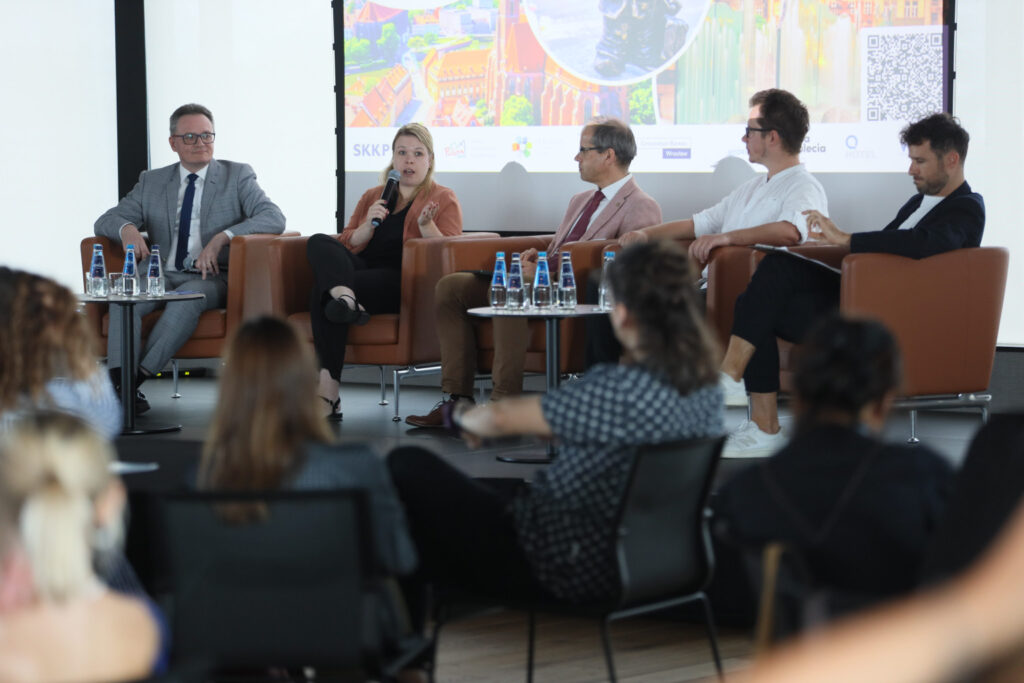
In the next part of her presentation, the guest from Germany discussed the capabilities of the Snapsight tool by Gevme. This tool, used during events such as Spotlight on Poland, allows recording audio from discussion panels, transcribing it, and extracting key insights from conversations held by panellists.
Discussion Panel
The first debate at the Spotlight on Poland conference, devoted to the topic “Tourism in the Age of AI: New Technological Reality as an Opportunity or Threat?”, brought together experts from various fields. The panellists included:
- Sina Bünte, founder of DigitalMind.events (https://www.linkedin.com/in/sinabuente)
- Dr Maciej Piasecki, associate professor at the Wrocław University of Science and Technology, Faculty of Computer Science and Telecommunications, Department of Artificial Intelligence (https://www.linkedin.com/in/maciej-piasecki-020b657)
- Krzysztof Rajda, head of AI at Brand24 (https://www.linkedin.com/in/krzysztof-rajda)
- Jarosław Marciuk from the Poland Convention Bureau – Polish Tourism Organisation (https://www.linkedin.com/in/jaroslawmarciuk)
The panel was moderated by Krzysztof Paradowski, partner and creative director at BluExperience (https://www.linkedin.com/in/krzysztof-paradowski-executive-mba-b02b3880).
Facts and thoughts
During the session, experts discussed the impact of artificial intelligence on the tourism industry. The discussion focused on its role in automating services, creating personalised offers, producing content through generative AI, and processing large amounts of data, as well as potential limitations. Panellists discussed the limitations of artificial intelligence, its tendency to make errors, and the importance of human creativity. They also raised concerns about the flood of AI-generated content on the internet. An extreme example is emerging online spaces that don’t exist in reality but offer fictional tourism services, misleading consumers and exposing them to losing money.
The PPLuM (Polish Large Language Model) project, led by the Wrocław University of Science and Technology (Faculty of Computer Science and Telecommunications, Department of Artificial Intelligence), was also mentioned. The PPLuM project aims to create an open Polish language model. A key element of the initiative is the development of a comprehensive and diverse data set that reflects the complexity of the Polish language. This will, among other things, foster innovation in both the public and private sectors through the development of tools like intelligent client assistants. An example of another Polish project in the tourism industry is Qtravel.ai.
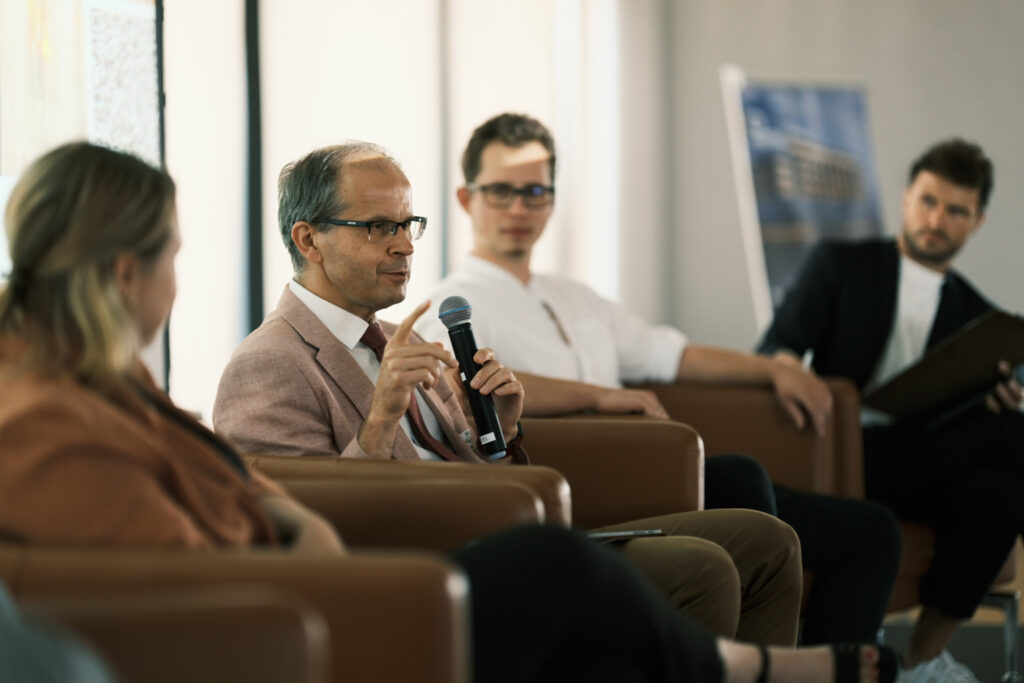
AI tools in the MICE industry
During the discussion, AI tools such as ChatGPT for generating text and HeyGen for creating video were mentioned, stressing the need for human oversight over processes created by AI. Generative AI can create texts, images, videos, and even music (e.g., Suno and Udio). To fully utilise the potential of this technology, one must understand how it works and the principles of its effective use. Tools like Gemini or ChatGPT can save a lot of time in marketing work, but employees should acquire new skills to effectively use the available AI tools on the market.
Sina Bünte listed several AI tools that can support marketing work in the MICE industry. Woom AI is a WhatsApp assistant that is useful for events, cities, and venues. The aforementioned Snapsight by Gevme is a tool for recording audio at conferences, which generates key information and idea clouds and offers full event reports. Examples of sessions from the IMEX fair can be found online. The tool works in multiple languages, including Polish. Except for Woom AI, all the tools mentioned offer a free plan.
Fireflies is an excellent notebook for online meetings, and HeyGen is used to create videos and avatars. This tool also works in many languages. Chatbase is a chatbot that can be integrated with a website, while Descript is used to summarise long videos, such as webinars or interviews, and can create blog posts or video clips. In turn, Gemma is a tool for creating PowerPoint presentations.
Additionally, Sina shared tips on effectively using ChatGPT. Key elements include properly phrasing questions, such as providing context and the type of content, sharing helpful information (such as links or documents), describing the text’s creator and target audience, and specifying the length of the response. It turns out that almost two years after the release of the first version, we still need to be reminded of this.
Opportunities
Companies are increasingly using artificial intelligence to make business decisions, but caution is advised when using this technology. Although AI offers new possibilities, it is still prone to errors and should not replace human experience or expert knowledge.
In the tourism industry, AI creates opportunities for better, more personalised tourist experiences and more efficient event planning, for example, by creating tailored itineraries, city break programmes, and facilitating participant inquiries with AI-powered assistants.
Despite growing interest in AI tools for event planning, some scepticism remains. Many still prefer recommendations based on human experience and intuition rather than those generated by AI. There is concern that over-reliance on artificial intelligence in social interactions, such as engaging on social media or giving recommendations, may weaken the value of human contact. Trust in AI-generated content and recommendations remains a significant issue, as cases of misinformation can lead to reputation crises.
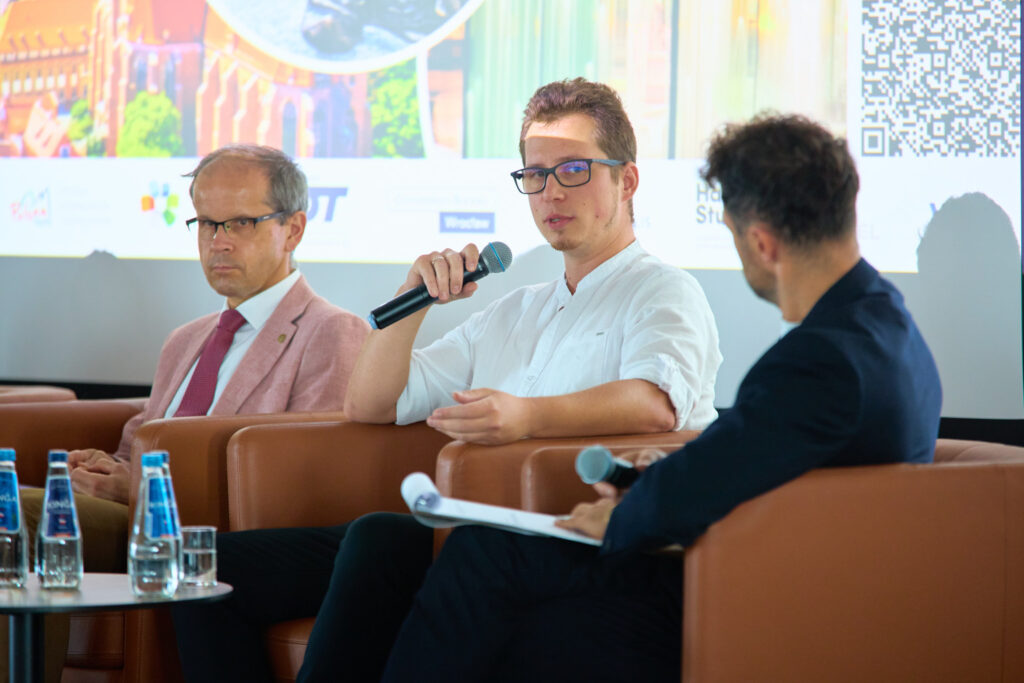
Data
AI plays an important role in data analysis, providing insights into online discussions, showing the impact of influencers on consumer choices, trend analysis, and predictive modelling. These capabilities can support marketing strategies and plan future events. An example is Brand24, which uses AI in social listening. AI is helpful in determining the sentiment of statements and thematically grouping discussions. A useful feature in Brand24 is the AI Assistant, which allows users to answer detailed questions about analysed key phrases. Thanks to artificial intelligence, it is also possible to generate insights and summaries, enabling users to quickly identify key communication threads, trends, and opinion leaders.
However, over-reliance on AI can become a risky convenience. In the event of a technological failure, companies and individuals could face significant disruptions in their operations, highlighting the need for contingency plans. During the discussion, it was acknowledged that AI can play an important role in event planning and creating personalised travel experiences. However, caution was advised to avoid becoming overly dependent on technology. From time to time, we hear about service outages, such as with Facebook or Instagram, and temporary user account suspensions. Similarly, on 4 June 2024, ChatGPT experienced technical issues and was unavailable to users. This raises questions about how much we can rely on such solutions.
Tools like MidJourney or ChatGPT can inspire creativity and generate new content ideas for promotional campaigns or event themes. Although AI can save time and automate many tasks, human intuition and creativity are irreplaceable. Therefore, AI integration should complement human skills rather than replace them. An example is a promotional video on TikTok and Instagram for the Elements Hotel & SPA in Świeradów-Zdrój, which went viral in Poland. The idea and execution of this video were the work of a woman, not artificial intelligence.
As Jarosław Marciuk pointed out, there is also growing concern about AI’s environmental impact. The high energy consumption of this technology is becoming a serious problem, especially as AI tools become more widespread.
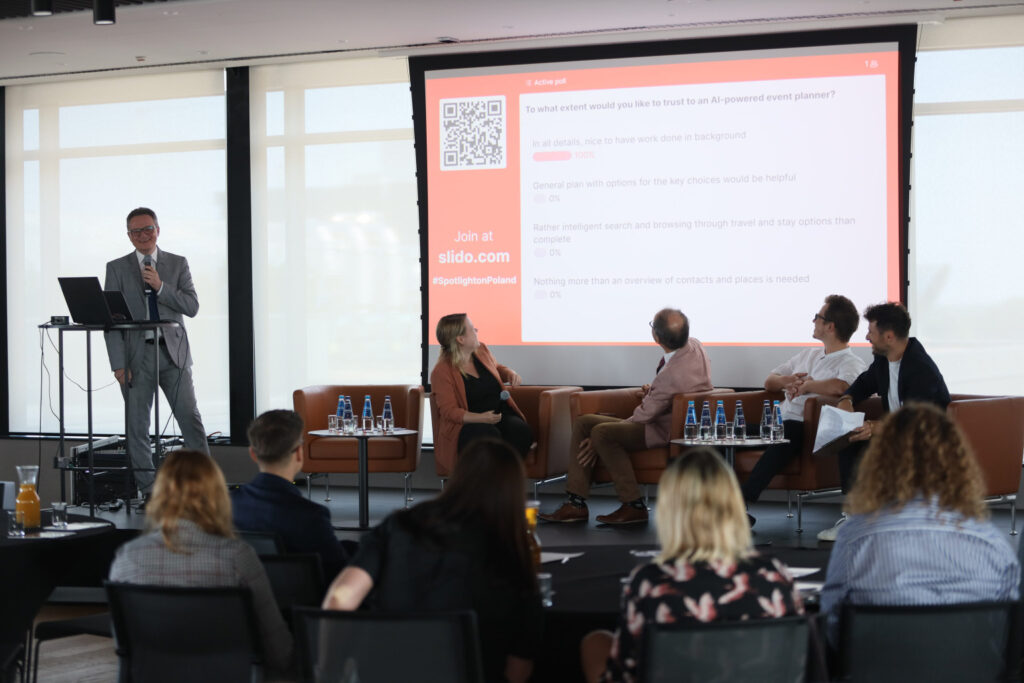
Summary and additional surveys
The session concluded with interactive surveys about preferences and trust in AI for travel decision-making and event planning. The survey results showed a human-centred approach while cautiously introducing technology into the tourism sector. Each one of the single-choice questions was answered by 30 people.
The questions were asked via the Slido app, and the following responses were obtained:
What would most convince you to visit a place during a holiday or city break?
- Getting personal recommendations – 63%
- Viewing real photos and videos from the location – 29%
- Viewing videos and photos created with generative AI support – 8%
How often do you use AI recommendations in business?
- Sometimes, after careful consideration, 54%
- Never, I don’t ask AI for recommendations – 32%
- Never, AI recommendations are useless in my business – 11%
- Very often, AI recommendations are valuable – 4%
I would like to start using this AI tool:
- Text generator, such as ChatGPT – 50%
- Presentation generator, such as Gemma – 25%
- Meeting note-taking tool, such as Fireflies – 13%
- Video generator, such as HeyGen – 13%
- Other tools – 0%
What is the most convenient option for choosing a potential place to stay for a tourist trip?
- • A search form with filtering options – 58%
- Search form plus interactive text descriptions and filtering options – 25%
- Intelligent chatbot (powered by AI and language models) to discuss requirements – 13%
- Intelligent voicebot (powered by AI and language models) to discuss options – 4%
To what extent would you use the services of an AI-powered event planner/meeting organiser?
- I would only need a general overview of contacts and places – 54%
- Intelligent search and overview of travel and venue options rather than complete organisation – 36%
- A general plan with key choice options would be helpful – 7%
- In every detail, it’s nice to have everything handled in the background – 4%
Tools used during the discussion panel: PowerPoint with Slido add-on, Slido, Snapsight.
Summary author: Jarosław Marciuk
#SpotlightonPoland #PolandCVB
Post Scriptum
The Polish Tourism Organisation – Poland Convention Bureau, and the Wrocław University of Science and Technology, Faculty of Computer Science and Telecommunications, Department of Artificial Intelligence, plan to establish close cooperation under the PLLuM project. Information on the websites, research, and publications of the Polish Tourism Organisation (POT) is up-to-date and comprehensive, making it a reliable and valuable data source for training language models (LLMs) and other AI models. As part of the planned cooperation, both parties plan regular information exchanges. We expect that close coordination and the involvement of both institutions will contribute to the success of the PLLuM project and to increasing innovation and efficiency in AI and tourism.
Read also:

